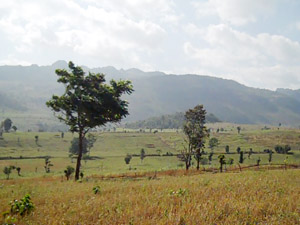According to locals, security has visibly tightened in Pruso Township since construction began on the military training ground.
 “Military checkpoints are already in place around the training ground area, but Burmese troops are also going around the town and villages to check on local residents. This surveillance disrupts peoples’ daily routines”, said a villager who was being checked by the security force.
“Military checkpoints are already in place around the training ground area, but Burmese troops are also going around the town and villages to check on local residents. This surveillance disrupts peoples’ daily routines”, said a villager who was being checked by the security force.
Last Wednesday, the Pruso market day, a security checkpoint was established on the main road to search every one using the road, including their possessions.
Every one passing through the checkpoint was upset and irritated. One resident commented: “There is already the Pan Kan checkpoint and then police inspection and now this!”
On August 10, 2011, construction began on the military training area of 2700 acres. This acreage was forcibly confiscated from the local farmers of Lawjar, DawLawku and Maprawshay villages located in Pruso Township by the LIB 576 of government troops.
According to local residents, this section of the Burmese army has tightened security as they want to prevent the Karenni soldiers from attacking them during the construction phase.
“We now feel frightened of travelling. We don’t have any freedom. We don’t know what will come next. If more troops are deployed, there will be more and more restrictions. The Karenni army once shelled the Burmese security force near Maprawshay village, but their camp was not hit. So these measures seem to be a massive overreaction.” , said a local source.
The government paid compensation of 50,000 kyats per acre for only 500 of the 2700 acres of land confiscated, claiming that the other 2,200 acres was lowland and unusable as farmlands. However, all of the confiscated lands are the ancestral property of the local farmers which they had used to cultivate and to earn for their livelihood.



